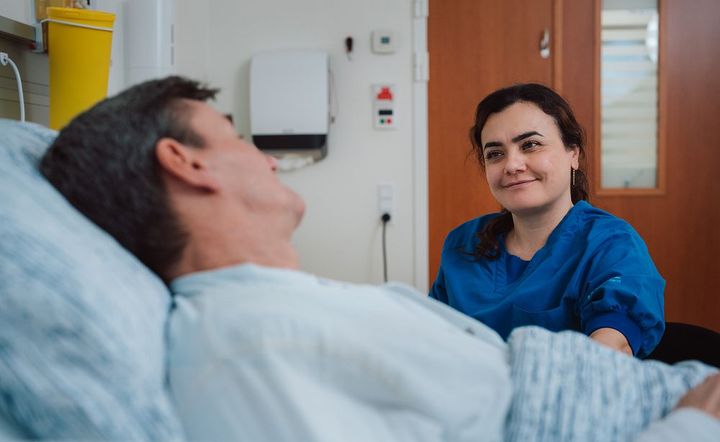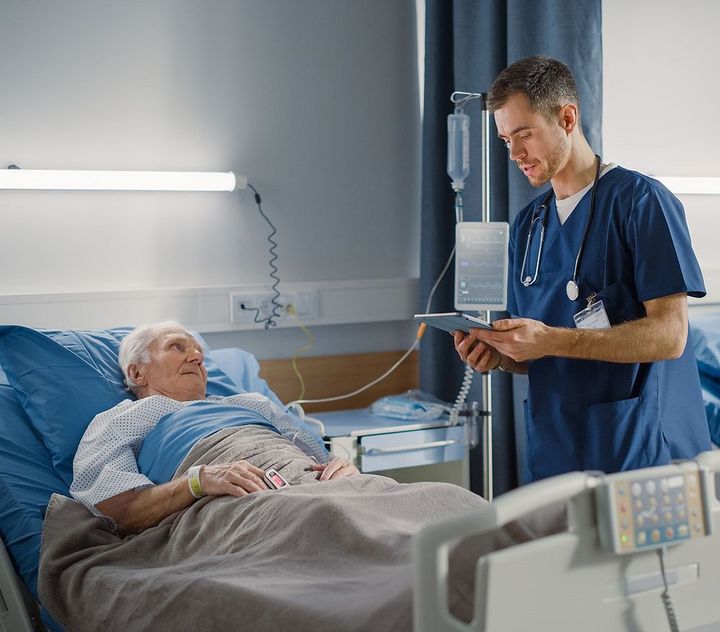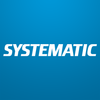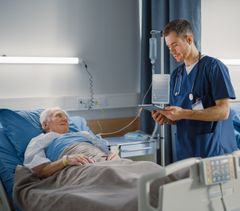Innovation project to increase well-being for patients and staff at super hospitals

The high-tech single-bed rooms at the new super hospitals are practical and efficient, but patients feel lonely. A new innovation project aims to develop a technical solution to enhance the well-being and communication of patients and staff alike.
As health staff at modern hospitals have to keep an eye on increasing numbers of patients in single-bed rooms, the patients are less often in contact with staff. This means that patients can feel overlooked and uncertain, while a fall or sudden deterioration in their condition is discovered later than if they had been in a multi-bed room.
A new project will investigate how the use of artificial intelligence (AI) and location data can improve well-being and mutual awareness between patients and health staff.
Uncertainty leads to staff being summoned more often
In collaboration with staff and patients from Bispebjerg Hospital and researchers at the University of Copenhagen, the Danish software company Systematic will develop an IT solution that patients can access via the bedside Powernet FlexCare monitor. It will give patients an overview of which doctors and nurses are assigned to them, and which of them are currently in the department. Patients are expected to be able to see what will be happening in the course of the day – and they can use the monitor to make contact with staff.
“The new super hospitals have given us the most high-tech – but also quite lonely – hospital rooms. The patients have ample peace and quiet and care, but the flip side is that they lose any sense of what is happening around them, and when they can be expected to learn more about their treatment. This makes them feel uncertain, resulting in staff being summoned more often. These are some of the challenges we want to address with this project,” says Brian Holch Kristensen, Chief Innovation Officer at Bispebjerg Hospital, which is one of the iAware innovation project partners.

Technology to remove barriers between patients and staff
By means of sensors, the project will register the routines in the departments as well as staff attendance. The idea is that, by employing AI, this data can be used to give patients an indication of when they can expect a ward round or a visit by, for example, the physiotherapist that day.
“In other words, we will use technology to remove the walls between patients and staff. iAware will create a kind of ‘mutual awareness’, where patients and health professionals become more aware of the treatment process, work routines and patient needs. The patients can see everything via the monitors in the room, while the staff can do so on the mobile phones they carry,” says Naja Holten Møller, Associate Professor at the Department of Computer Science at the University of Copenhagen.
She expects that the solution, via information sharing with patients, will reduce the number of patient calls, which can be a stress factor for staff. On the other hand, it will also ensure that reticent patients who are reluctant to disturb busy staff are not overlooked. This is because the system informs the staff that it’s time to check up on a patient or perform a scheduled task.

Data goes both ways
A call from a patient who needs help with a specific task is sent to the relevant employee, i.e. the person with the right skills for the task who finds themselves in close proximity to the patient. This means fewer steps for staff and better utilisation of their time, while also doing away with the flashing lamps that disturb everyone in the corridor.
“Lots of hospital technology has been developed to support the clinical work. iAware is innovative because the solution focuses on the well-being and peace of mind of both patients and employees, and because it provides patients with insights into the staff’s work routines. Until now, the focus has been on gathering data about patients – now patients will also find out about the work of the department,” says Lene Buch, Senior Clinical Adviser, Systematic.
She also emphasises the importance of an ethical and responsible approach to the use of AI and tracking technology, and patients and staff are therefore also involved in the development work – the solution will be co-created by all relevant parties.
A prototype is expected to be ready for testing in 2026.
The consortium behind the iAware project comprises Systematic, the Department of Computer Science at the University of Copenhagen, Bispebjerg Hospital, the technology company Powernet and the Danish Society for Patient Safety.
The project has received DKK 9 million from Innovation Fund Denmark.
Keywords
Images
Subscribe to releases from Systematic
Subscribe to all the latest releases from Systematic by registering your e-mail address below. You can unsubscribe at any time.
Latest releases from Systematic
Systematic launches cutting-edge cloud-enabled C4ISR enhancements to the SitaWare Suite15.7.2025 06:30:00 CEST | Press release
Latest updates deliver new cloud solutions to the SitaWare suite, as new features available for users.
NATO and Systematic mark Initial Operational Capability for SitaWare Headquarters - NATO’s future land C2 capability19.6.2025 12:10:29 CEST | Press release
The NATO Communications and Information Agency (NCI Agency) and Systematic have formally marked the achievement of the Initial Operational Capability (IOC) for SitaWare Headquarters – NATO’s new command-and-control (C2) software for land forces, delivered under the DEMETER FLC2 project. The IOC declaration marks a significant step in modernising NATO’s land C2 capabilities. It supports the alliance’s transition towards more agile, data-driven decision-making with SitaWare Headquarters playing an integral role in strengthening C2 infrastructure across the land domain. The solution supports information superiority across strategic and operational levels, enabling NATO land forces to share accurate, real-time data in dynamic and contested environments. The Initial Operational Capability status reflects successful delivery across several core areas, including the deployment of SitaWare Headquarters at NATO sites, its integration into the alliance’s operational command framework, the provis
Royal Navy extends Systematic MTF contract for five years12.5.2025 12:17:34 CEST | Press release
Systematic specialists continue to work at the heart of military messaging software. Aarhus, 12 May 2025. The UK’s Royal Navy (RN) has awarded Systematic a five-year extension for the ongoing support for leadership of the development of Message Text Formats (MTFs) and production of the NATO Message Catalogue (APP-11). The 407 message formats in the latest edition of the catalogue cover the full spectrum of warfare from strategic, through mission tasking, CBRN warning and reporting, right down to individual units making routine logistics requests. The format makes them suitable for use in narrow bandwidth and satellite-denied environments, while still allowing human and computer processing. The RN’s Navy Digital team are the designated custodian of APP-11 on behalf of NATO. As Custodian, the RN is responsible for producing the catalogue which is distributed to every operational unit in the alliance. Contracting Systematic allows the RN to discharge this responsibility with confidence. I
Systematic re-wins valuable contract for Denmark’s library system13.1.2025 06:30:00 CET | Press release
The software company Systematic has just signed an important, three-digit DKK million contract with the Danish municipalities’ joint IT organisation KOMBIT to continue the development and operation of the IT system for all public and school libraries in Denmark until 2038. Supplying Denmark’s national library system since 2015 has opened doors to new international markets for Systematic with its Cicero library system. The contract expires at the end of 2025, and KOMBIT’s choice of supplier for the Common Library System (FBS) 2.0 has been eagerly awaited by the software company. Systematic was awarded the contract shortly before New Year, and will now develop and implement the libraries’ new IT solution as well as handling operations and further development in the coming years. The contract, signed with KOMBIT on behalf of Denmark’s ’s municipalities, has an estimated value of DKK 220 million. Denmark a source of inspiration for foreign countries Since 2015, Systematic’s library system
Global need for defence cooperation drives revenue to new highs at Systematic12.12.2024 11:07:29 CET | Press release
With a new CEO at the helm, the software company Systematic continues to grow, expanding with three new offices and delivering record financial results for the third consecutive year. The 2023/2024 financial year has ended for the software company Systematic with the biggest revenue in the company’s history: EUR 218 million, which equates to growth of 13.5%. The profit after tax is EUR 34 million – up 25% on the previous year. Of the company’s total order intake, 65% came from abroad in 2023/2024. In spite of massive investments in product development, innovation and employee well-being, the company posted an EBIT of EUR 44.6 million. This corresponds to an EBIT margin of 20.5% compared to 18.5% last year, which according to CEO Nikolaj Bramsen, is completely in line with the company’s strategy. “We’re focusing on what we do best – creating usable and effective solutions for critical sectors such as defence, healthcare, security and the utilities. Our success is based on developing sta
In our pressroom you can read all our latest releases, find our press contacts, images, documents and other relevant information about us.
Visit our pressroom


